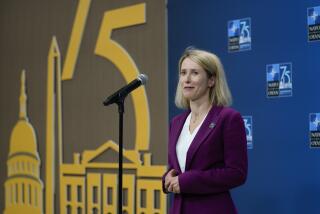Estonians Vote--but Russians Are Barred
- Share via
MOSCOW — Estonians cast ballots for a new president and Parliament on Sunday in an election overshadowed by the tiny Baltic country’s citizenship rules, which bar more than 40% of the population, mainly Russians, from voting.
With half the vote counted early today, election authorities reported that Arnold F. Ruutel, a former Communist Party boss and Estonia’s current leader, was leading in the presidential contest with about 43% of the vote. He was followed by former Foreign Minister Lennart Meri with 29.5% and Rein Taagepera, a longtime professor at California’s UC Irvine, with 23.5%.
If no candidate wins at least 50% of the votes, the new Parliament will pick the president from the two front-runners.
Whatever its final outcome, the election already appeared to have hurt Estonia’s relations with Russia, damaged its human rights reputation and increased the likelihood of violence between Russians and Estonians.
“The situation in which 42% of the Estonian republic’s population are barred from elections does not fit within the framework of international law,” Nikolai Medvedev, chairman of a joint Russian-Estonian watchdog panel, told Russia’s Itar-Tass news agency.
Taagepera has warned of the possibility of a “Yugoslav-type situation” if ethnic tension in Estonia worsens.
Estonian law grants automatic citizenship only to people who lived there before Soviet annexation of the Baltic states during World War II and their descendants. Other residents must have lived there for two years, know at least 1,500 words of the Estonian language and formally apply for citizenship.
In the face of Russian complaints, Estonians defended their law Sunday.
“There is no reason to say that the elections are unfair,” Estonian lawmaker Mart Laar said in a telephone interview from the capital, Tallinn. “Are foreign citizens allowed to vote in the Western countries of Europe and America?
“Some people say that the law on citizenship is unfair, but I don’t see why,” Laar continued. “It doesn’t give any privileges to any particular nationality. It is not built on the nationality factor. Any person who has lived in Estonia for two years, knows the language and wishes to become a citizen is entitled to become one.”
The citizenship rules reflect the threat that the Estonians feel to their nationhood after emerging from 50 years in the Soviet empire, years during which Russians, Ukrainians and other ethnic groups flowed freely into the relatively prosperous republic.
After winning independence 13 months ago, Estonia and the other two Baltic states, Latvia and Lithuania, were caught between their desire to reclaim their lands for their own people and their obligations to all the residents of their territories.
The Estonian election is the clearest case so far of discrimination against non-Baltic ethnic groups, but Russia has also complained of similar tendencies in Latvia and Lithuania.
Medvedev said Russia was so disturbed by the election that it could go as far as suspending the basic state treaty between Russia and Estonia.
Russian-Baltic relations have already been strained for months by tension over the withdrawal of Russian troops from the three countries. The Baltic states want the troops withdrawn right away, while Russian military officials complain that they have nowhere to put them.
More to Read
Sign up for Essential California
The most important California stories and recommendations in your inbox every morning.
You may occasionally receive promotional content from the Los Angeles Times.













